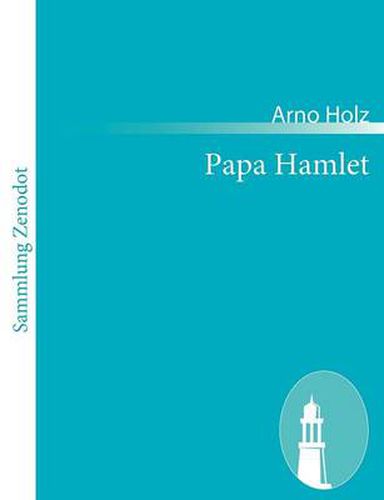Readings Newsletter
Become a Readings Member to make your shopping experience even easier.
Sign in or sign up for free!
You’re not far away from qualifying for FREE standard shipping within Australia
You’ve qualified for FREE standard shipping within Australia
The cart is loading…






This title is printed to order. This book may have been self-published. If so, we cannot guarantee the quality of the content. In the main most books will have gone through the editing process however some may not. We therefore suggest that you be aware of this before ordering this book. If in doubt check either the author or publisher’s details as we are unable to accept any returns unless they are faulty. Please contact us if you have any questions.
Adultery, vulgarity, disordered lives on the brink of collapse: the feverish existence of failed actor Niels Thienwiebel shocked German readers when PAPA HAMLET was first published in 1889. In declaiming the soliloquies of his most famous role, the great Thienwiebel finds delusional refuge from the squalid room he shares with despondent wife Amalie and infant son Fortinbras. But it was the radical style as much as the moral outrage of this novella that so confounded contemporaries. Reflecting their own bohemian Berlin milieu, Arno Holz and Johannes Schlaf showed the dream of the self-authored life turning to nightmare through apathy and self-absorption. Originally credited to a fabricated Norwegian writer, PAPA HAMLET signalled the explosive arrival of Naturalism while also pointing ahead to Modernism; its appropriations, irony and play of identity even foretold Postmodernism. Appearing for the first time in English, it is teamed here with an early incarnation of the same narrative by Schlaf alongside further collaborations with Holz. Together their fearless candour and anarchic ingenuity reveal another side to German Naturalism that is well overdue for rediscovery.
Fiction. Translated by James J. Conway.
$9.00 standard shipping within Australia
FREE standard shipping within Australia for orders over $100.00
Express & International shipping calculated at checkout
This title is printed to order. This book may have been self-published. If so, we cannot guarantee the quality of the content. In the main most books will have gone through the editing process however some may not. We therefore suggest that you be aware of this before ordering this book. If in doubt check either the author or publisher’s details as we are unable to accept any returns unless they are faulty. Please contact us if you have any questions.
Adultery, vulgarity, disordered lives on the brink of collapse: the feverish existence of failed actor Niels Thienwiebel shocked German readers when PAPA HAMLET was first published in 1889. In declaiming the soliloquies of his most famous role, the great Thienwiebel finds delusional refuge from the squalid room he shares with despondent wife Amalie and infant son Fortinbras. But it was the radical style as much as the moral outrage of this novella that so confounded contemporaries. Reflecting their own bohemian Berlin milieu, Arno Holz and Johannes Schlaf showed the dream of the self-authored life turning to nightmare through apathy and self-absorption. Originally credited to a fabricated Norwegian writer, PAPA HAMLET signalled the explosive arrival of Naturalism while also pointing ahead to Modernism; its appropriations, irony and play of identity even foretold Postmodernism. Appearing for the first time in English, it is teamed here with an early incarnation of the same narrative by Schlaf alongside further collaborations with Holz. Together their fearless candour and anarchic ingenuity reveal another side to German Naturalism that is well overdue for rediscovery.
Fiction. Translated by James J. Conway.